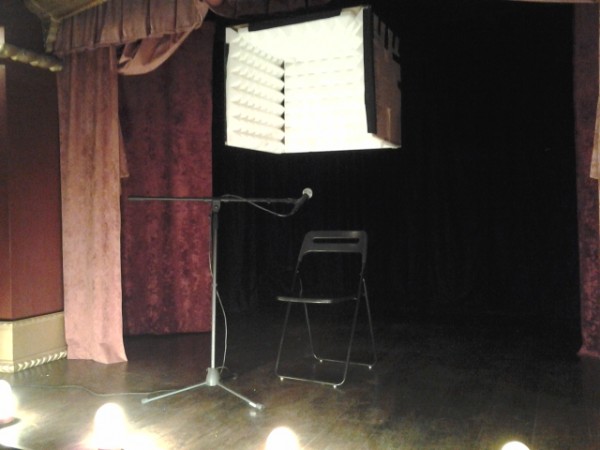As part of a major 2013 architectural installation by Chris Weisbart, artist Joe Seeley and a team of hearty volunteers installed an 18 seat victorian opera house in the basement of Machine Project.
The theater’s suitability for close listening and its aura of idiosyncratic endurance inspired this audio archive, which we began compiling this Spring. The overlapping social spaces of the theater and of the audio recordings made in the theater became emblematic for us of Machine Project’s core interest in the different ways of being together in time and space that art allows us to explore, and of the social space of poetry itself, a space that Peter Gizzi, who gave a powerful reading for this project, has emphatically called “100% real and 100% imaginary.”
Each of the literally underground recordings we made was attended by a small secretly gathered audience. Each evening was casual and intimate, yet the uncanny formality of the space—and the powerfully effective if makeshift soundproofing box that descended upon the head of each reader like a helmet (see images below)—framed this intimacy, instilling performative distance, metonymic of the eerie intimacy and necrodistance of audio recording itself. From these original basement gatherings where they were recorded, it is our hope that the poems presented here will continue to radiate outward and gather new listeners into their occult assemblies of sound, image, feeling and thought.
In fidelity to the original gatherings that each recording session was, we’ve arranged the readings here by date. In my ceremonial capacity of “Machine Poet Laureate” I curated the majority of the recordings, the exceptions being noted. Thanks to our guest curators: Joseph Mosconi, Dolores Dorantes, and Machine Project Founder and Executive Director, Mark Allen. Extra special thanks to our marvelous Sound Engineer Chris Candelaria for making these recordings sound so good, to tireless and ingenious Machine Project Operations Manager Lucas Wrench for making sure these recordings actually happened, and to the Tang Museum of Art for providing much needed support.
Yours,
Anthony McCann
